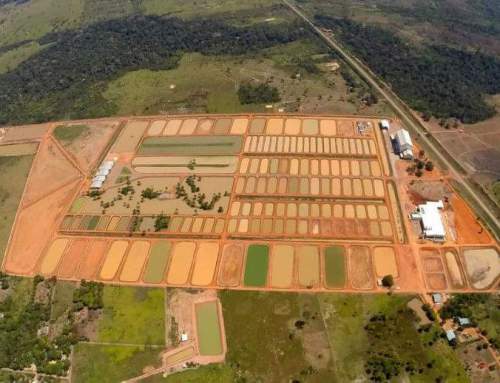Swine production in partnership with small and medium integrated local producers
The swine production value chain was non-existent in the state of Acre until 2012. However, with the growth of poultry production value chain in Alto Acre, led by Acreaves, the demand for swine meat for production of deli and cold cuts (salami, sausage, ham) started to grow exponentially. At the same time, the local pork meat demand was historically met by importing products from other far away Brazilian states, such as Santa Catarina and Paraná. This resulted in expensive freight costs and delays, both of which were passed on the Acre’s consumers.
Thus, in 2013 Dom Porquito was officially started with a structure that involves a UPL (Piglet Production Unit), pig fattening sheds (in partnership with smallholder farmers) and a modern processing plant.
Dom Porquito was created with the concept of a partnership between Public, Private and Community stakeholders. The Acre government, through an state development agency, provided the initial funding for the establishment of the company with the premise that there would be a strong involvement of smallholder farmers in the value chain (in 2015, these farmers were reunited under a local cooperative, which would later become a shareholder of Dom Porquito). Entrepreneur Paulo Santoyo, along with a qualified group of partners, led the process of creating and growing the company to its current stage.
The company uses state-of-the-art technology, using animal genetics provided by Agroceres, a leading company in the sector, associated with a strict sanitary control scheme. In this respect, sanitary control of local production benefited from the partially isolated farms of small producers, forming a natural sanitary barrier and ensuring animal health and creating a favorable scenario compared with others regions of the country.
To ensure the welfare of the animals, the UPL (Piglet Production Unit) construction was adapted to the characteristics of the region, using negative pressure ventilation systems and computerized systems for feeding and monitoring environmental conditions, providing the maintenance of ideal humidity and temperature levels for the growth and well-being of the animals.
Dom Porquito’s partner farmers have an income over R$ 3,000 month (US$ 1,000/month). These farmers are organized in a local cooperative, which is a shareholder of the company, extending the smallholder farmers’ income from Dom Porquito S.A. since they earn dividends from the company’s industrial profits as well as the income generated from raising the piglets.
The expansion of swine production has helped the expansion and consolidation of corn farming in the state of Acre, generating another alternative income for small and medium sized farmers. It is also expected that the increase in swine production have a positive effect on the maintenance of native forest, given that the generation of income from this activity is significant and the farm area used for the shed is minimal (500 to 1,000 m2), both of which may discourage the cutting of new forest areas for expansion of other extensive activities such as beef cattle production and slash and burn agriculture.
Finally, the company is expected to, not only meet local demand, but also have a significant share of the export market to the Andean countries, ensuring new foreign exchange flows for the state of Acre and a boost to its economy, which historically has very little diversification and is very dependent on the government sector.










